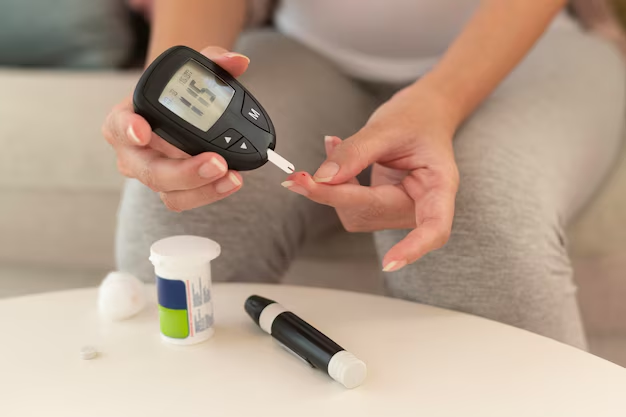Your Guide to Can Diabetes Cause Seizures
What You Get:
Free Guide
Free, helpful information about Diabetes FAQ and related Can Diabetes Cause Seizures topics.
Helpful Information
Get clear and easy-to-understand details about Can Diabetes Cause Seizures topics and resources.
Personalized Offers
Answer a few optional questions to receive offers or information related to Diabetes FAQ. The survey is optional and not required to access your free guide.
Understanding the Link Between Diabetes and Seizures: What You Need to Know
Diabetes is a complex condition that affects millions of people worldwide. While many are familiar with its symptoms and complications, few realize the potential connection between diabetes and seizures. Can diabetes cause seizures? In a word, yes. Here's how impaired glucose regulation might lead to seizures and what you can do to manage this risk.
How Diabetes Can Lead to Seizures
Hypoglycemia, or low blood sugar, is one of the primary ways diabetes can cause seizures. When blood sugar levels drop too low, the brain, which relies heavily on glucose for energy, can malfunction, leading to convulsions. Recognizing early symptoms of hypoglycemia, such as dizziness, confusion, or unusual hunger, is essential in preventing seizures.
On the flip side, hyperglycemia, or high blood sugar, can also lead to serious complications like seizures. Although less common, extremely high blood sugar can lead to a state called hyperglycemic hyperosmolar syndrome (HHS), which can sometimes result in seizures. Maintaining balanced blood glucose levels through medication and lifestyle changes is crucial for individuals with diabetes.
Diabetic ketoacidosis (DKA) is another severe diabetes-related condition that can trigger seizures. DKA occurs when the body begins to break down fat and muscle too quickly due to insufficient insulin, leading to a buildup of ketones in the blood. As ketone levels rise, the blood becomes more acidic, potentially causing seizures among other life-threatening complications.
Managing the Risk of Seizures in Diabetes
Ensuring stable blood sugar levels is the frontline defense against diabetes-induced seizures. Here are some effective strategies:
- Frequent Monitoring: Regularly check your blood sugar levels using a glucose meter. Timely monitoring allows for quick adjustments in diet or medication.
- Balanced Diet: Consuming a healthy, balanced diet helps maintain stable glucose levels. Focus on fiber-rich foods like whole grains, vegetables, and lean protein while limiting sugar and processed foods.
- Consistent Medication: Adhere strictly to your prescribed insulin or oral medication regimen to prevent both hypoglycemia and hyperglycemia.
- Regular Exercise: Physical activity helps improve insulin sensitivity and regulate blood sugar. Ensure to coordinate with your healthcare provider to tailor activities that suit your health status.
Financial Resources and Support for Diabetes Management
Managing diabetes can be financially burdensome. Various programs and resources are available to aid those in need. From government aid to credit solutions, here's how you can ease the financial strain of managing your diabetes:
- Medicaid & Medicare: These government programs provide low-cost or free health services, including coverage for diabetes care and supplies.
- Prescription Assistance Programs: Pharmaceutical companies often offer copay assistance or free drug programs for those unable to afford their diabetes medications.
- Flexible Spending Accounts (FSAs): Use pretax dollars to pay for diabetes care through employer-offered FSAs, reducing the financial hit of managing your condition.
- Nonprofit Organizations: Some nonprofits offer financial assistance, free medical supplies, or educational resources to help individuals manage diabetes.
- Credit Counseling Services: Organizations offering professional guidance can help you manage your credit and eliminate debt, providing some financial relief in dealing with diabetes care costs.
Financial and Educational Assistance Options
- 💊 Medicaid/Medicare: Broad internet-subsidized medical coverage for eligible individuals.
- 🩹 Prescription Assistance: Programs by pharmaceutical companies to lower medication expenses.
- 💼 Flexible Spending Accounts (FSAs): Tax-advantaged accounts for medical expenses.
- 🤝 Nonprofit Organizations: Charities offering support and resources for diabetes management.
- 🏦 Credit Counseling: Professional help to manage loans and budget effectively.
What You Get:
Free Diabetes FAQ Guide
Free, helpful information about Can Diabetes Cause Seizures and related resources.

Helpful Information
Get clear, easy-to-understand details about Can Diabetes Cause Seizures topics.

Optional Personalized Offers
Answer a few optional questions to see offers or information related to Diabetes FAQ. Participation is not required to get your free guide.


